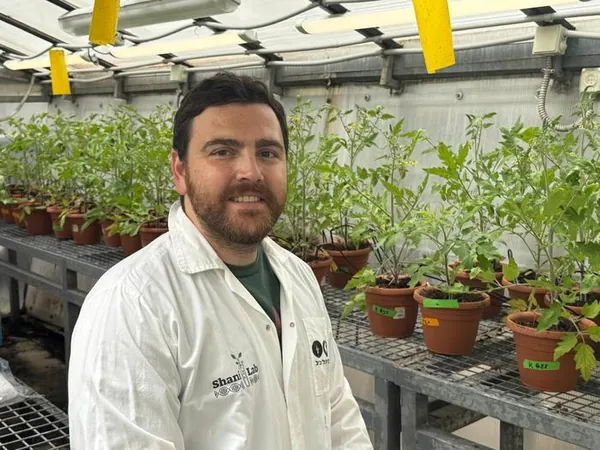
Revolutionary Gene Editing Technique Unleashes Potential of Tomato Traits
2025-06-17
Author: Emily
A Game-Changer for Agriculture
Researchers from Tel Aviv University are breaking ground in the world of agriculture with a new gene editing method that targets and transforms key characteristics in tomato plants, including taste and shape. This innovative approach holds promise not only for tomatoes but could also pave the way for advancements across various crop species, forming the backbone of future, improved plant varieties.
Unlocking the Secrets of Plant Genetics
Led by prominent scientists Prof. Eilon Shani, Prof. Itay Mayrose, and PhD student Amichai Berman, this study collaborates with scholars from the University of Chinese Academy of Sciences and the Israeli agri-tech firm NetaGenomiX. The eye-opening findings were recently unveiled in the prestigious journal Nature Communications.
Prof. Shani highlights the urgency of this research, stating, As global changes accelerate, it is imperative to innovate agriculture to feed the rising population. Our focus on gene editing is crucial in developing plants that thrive under diverse conditions, boasting attributes like drought resistance and enhanced flavor.
CRISPR: The Powerhouse of Genetic Editing
CRISPR technology, heralded as a revolutionary tool, allows for precise modifications of plant genetics. However, challenges remain. Traditionally, the limited capacity for editing multiple genes simultaneously has held back progress due to the complexity of genetic redundancy—where similar genes can mask each other’s effects. The Tel Aviv University team has cracked this code.
Berman explains, By aiming to modify entire gene families at once, we developed a specialized algorithm that identifies the perfect CRISPR units. This technology not only enhances editing efficiency but also helps researchers delve into the functions of thousands of genes.
From Theory to Practice: A Tomato Transformation
In a groundbreaking move, the researchers crafted 10 CRISPR libraries containing around 15,000 unique editing units targeting specific gene families within the tomato genome. Applying these to nearly 1,300 tomato plants, they meticulously observed how these genetic tweaks impacted traits such as fruit size, shape, taste, nutrient efficiency, and disease resilience.
Remarkably, many of the newly edited plants displayed sweetness levels that drastically deviated from their unaltered counterparts, suggesting a tantalizing future of taste-enhanced tomatoes.
The Future of Food: Endless Possibilities Await
This compelling research is not just a leap for tomatoes but signals a broader shift in agricultural science. As scientists continue to harness the power of genetics, we inch closer to sustainable solutions that could transform how we grow our food and secure our global food supply. Prepare for a future where our fruits and vegetables are not just resilient but deliciously tailored to our tastes!









 Brasil (PT)
Brasil (PT)
 Canada (EN)
Canada (EN)
 Chile (ES)
Chile (ES)
 Česko (CS)
Česko (CS)
 대한민국 (KO)
대한민국 (KO)
 España (ES)
España (ES)
 France (FR)
France (FR)
 Hong Kong (EN)
Hong Kong (EN)
 Italia (IT)
Italia (IT)
 日本 (JA)
日本 (JA)
 Magyarország (HU)
Magyarország (HU)
 Norge (NO)
Norge (NO)
 Polska (PL)
Polska (PL)
 Schweiz (DE)
Schweiz (DE)
 Singapore (EN)
Singapore (EN)
 Sverige (SV)
Sverige (SV)
 Suomi (FI)
Suomi (FI)
 Türkiye (TR)
Türkiye (TR)
 الإمارات العربية المتحدة (AR)
الإمارات العربية المتحدة (AR)